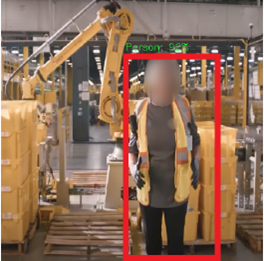Francesco Pasti and Nicola Bellotto
Proceedings of the 18th International Conference on Computer Vision Theory and Applications (VISAPP)

Abstract
Person detection applications based on computer vision techniques often rely on complex Convolutional Neural Networks that require powerful hardware in order achieve good runtime performance. The work of this paper has been developed with the aim of implementing a safety system, based on computer vision algorithms, able to detect people in working environments using an embedded device. Possible applications for such safety systems include remote site monitoring and autonomous mobile robots in warehouses and industrial premises. Similar studies already exist in the literature, but they mostly rely on systems like NVidia Jetson that, with a Cuda enabled GPU, are able to provide satisfactory results. This, however, comes with a significant downside as such devices are usually expensive and require significant power consumption. The current paper instead is going to consider various implementations of computer vision-based person detection on two power-efficient and inexpensive devices, namely Raspberry Pi 3 and 4. In order to do so, some solutions based on off-the-shelf algorithms are first explored by reporting experimental results based on relevant performance metrics. Then, the paper presents a newly-created custom architecture, called eYOLO, that tries to solve some limitations of the previous systems. The experimental evaluation demonstrates the good performance of the proposed approach and suggests ways for further improvement.
@inproceedings{pasti2023evaluation,
title={Evaluation of Computer Vision-Based Person Detection on Low-Cost Embedded Systems},
author={Pasti, Francesco and Bellotto, Nicola and others},
booktitle={Proceedings of the 18th International Conference on Computer Vision Theory and Applications (VISAPP)},
year={2023}
}

